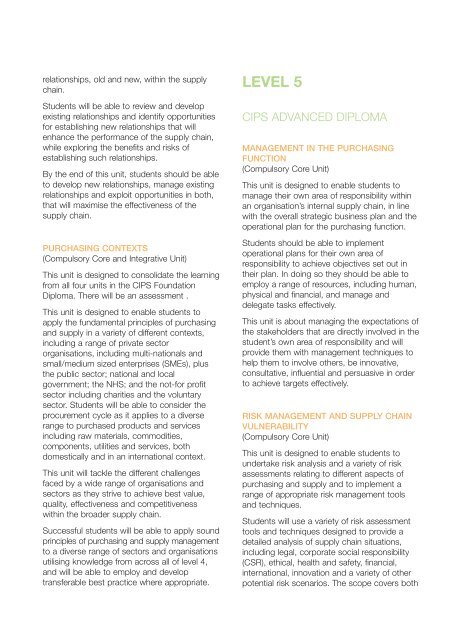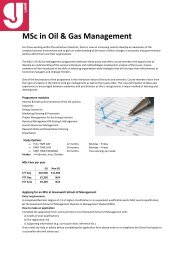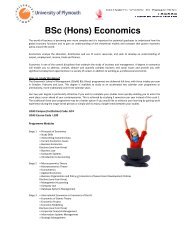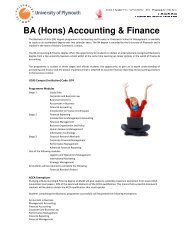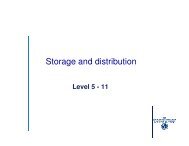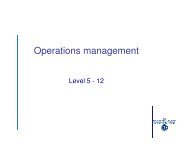(CIPS) Graduate Diploma - Greenwich School of Management
(CIPS) Graduate Diploma - Greenwich School of Management
(CIPS) Graduate Diploma - Greenwich School of Management
Create successful ePaper yourself
Turn your PDF publications into a flip-book with our unique Google optimized e-Paper software.
elationships, old and new, within the supply<br />
chain.<br />
Students will be able to review and develop<br />
existing relationships and identify opportunities<br />
for establishing new relationships that will<br />
enhance the performance <strong>of</strong> the supply chain,<br />
while exploring the benefits and risks <strong>of</strong><br />
establishing such relationships.<br />
By the end <strong>of</strong> this unit, students should be able<br />
to develop new relationships, manage existing<br />
relationships and exploit opportunities in both,<br />
that will maximise the effectiveness <strong>of</strong> the<br />
supply chain.<br />
PURCHASING CONTEXTS<br />
(Compulsory Core and Integrative Unit)<br />
This unit is designed to consolidate the learning<br />
from all four units in the <strong>CIPS</strong> Foundation<br />
<strong>Diploma</strong>. There will be an assessment .<br />
This unit is designed to enable students to<br />
apply the fundamental principles <strong>of</strong> purchasing<br />
and supply in a variety <strong>of</strong> different contexts,<br />
including a range <strong>of</strong> private sector<br />
organisations, including multi-nationals and<br />
small/medium sized enterprises (SMEs), plus<br />
the public sector; national and local<br />
government; the NHS; and the not-for pr<strong>of</strong>it<br />
sector including charities and the voluntary<br />
sector. Students will be able to consider the<br />
procurement cycle as it applies to a diverse<br />
range to purchased products and services<br />
including raw materials, commodities,<br />
components, utilities and services, both<br />
domestically and in an international context.<br />
This unit will tackle the different challenges<br />
faced by a wide range <strong>of</strong> organisations and<br />
sectors as they strive to achieve best value,<br />
quality, effectiveness and competitiveness<br />
within the broader supply chain.<br />
Successful students will be able to apply sound<br />
principles <strong>of</strong> purchasing and supply management<br />
to a diverse range <strong>of</strong> sectors and organisations<br />
utilising knowledge from across all <strong>of</strong> level 4,<br />
and will be able to employ and develop<br />
transferable best practice where appropriate.<br />
LEVEL 5<br />
<strong>CIPS</strong> ADVANCED DIPLOMA<br />
MANAGEMENT IN THE PURCHASING<br />
FUNCTION<br />
(Compulsory Core Unit)<br />
This unit is designed to enable students to<br />
manage their own area <strong>of</strong> responsibility within<br />
an organisation’s internal supply chain, in line<br />
with the overall strategic business plan and the<br />
operational plan for the purchasing function.<br />
Students should be able to implement<br />
operational plans for their own area <strong>of</strong><br />
responsibility to achieve objectives set out in<br />
their plan. In doing so they should be able to<br />
employ a range <strong>of</strong> resources, including human,<br />
physical and financial, and manage and<br />
delegate tasks effectively.<br />
This unit is about managing the expectations <strong>of</strong><br />
the stakeholders that are directly involved in the<br />
student’s own area <strong>of</strong> responsibility and will<br />
provide them with management techniques to<br />
help them to involve others, be innovative,<br />
consultative, influential and persuasive in order<br />
to achieve targets effectively.<br />
RISK MANAGEMENT AND SUPPLY CHAIN<br />
VULNERABILITY<br />
(Compulsory Core Unit)<br />
This unit is designed to enable students to<br />
undertake risk analysis and a variety <strong>of</strong> risk<br />
assessments relating to different aspects <strong>of</strong><br />
purchasing and supply and to implement a<br />
range <strong>of</strong> appropriate risk management tools<br />
and techniques.<br />
Students will use a variety <strong>of</strong> risk assessment<br />
tools and techniques designed to provide a<br />
detailed analysis <strong>of</strong> supply chain situations,<br />
including legal, corporate social responsibility<br />
(CSR), ethical, health and safety, financial,<br />
international, innovation and a variety <strong>of</strong> other<br />
potential risk scenarios. The scope covers both


